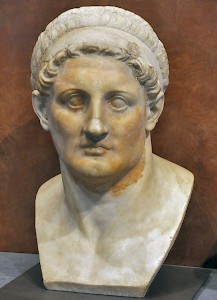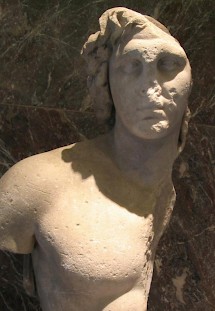Ptolemy I Soter (4)
Ptolemy I Soter (367-282): friend and biographer of the Macedonian conqueror Alexander the Great, after his death king of Egypt, founder of the the Ptolemaic dynasty, one of the Diadochi.
Historian

Ptolemy wrote memoirs on Alexander's campaigns. It is possible that he started to write them to prove that he was worthy of the royal title he had assumed. For example, he wrote that he had killed an Indian king and had stripped him of his armor, an incident that must have reminded his readers of the behavior of the heroes of Homer, who had been kings.
Except for a few lines, Ptolemy's Histories are solely known from one source: Arrian's Anabasis. This is sufficient, however, to come to some conclusions about the nature of this book.
- Ptolemy uses Callisthenes' Deeds of Alexander and a sequel, because he has the correct chronology of the events and knows the names of all appointees.
- Ptolemy sometimes exaggerates his own role. For example, he gave himself an important role in the battle near Issus, and claimed that Alexander appreciated his officer so much that he personally saw to his cure after he had been hit by a poisoned arrow.
- Ptolemy's work was biased against Antigonus Monophthalmus, one of Ptolemy's rivals in the wars after the death of Alexander; Antigonus' successful campaigns in what is now Turkey are completely ignored. Perdiccas also received an unfair treatment.
- Ptolemy concentrated on the war itself. There are no indications that his memoirs contained digressions on other subjects. A unifying psychological concept, like Cleitarchus' idea that Alexander's success corrupted him or Aristobulus' pothos-motif, seems to have been absent. In Ptolemy's view, Alexander had been a rational expansionist.

At one place, Ptolemy corrects Cleitarchus' account of Alexander's campaigns, and this proves that Ptolemy's history was published after the History of Alexander, which can be dated between 310 and 301. However, we can perhaps be a little bit more precise. There are indications that Ptolemy's memoirs were published before 301, because in that year, Antigonus was killed, which made Ptolemy's bias against his rival rather pointless. This argument, however, is not conclusive; after all, Ptolemy's Histories were also hostile towards Perdiccas, who was already dead for at least a decade.
It is interesting to note that the statement that Ptolemy, as a king, could not have lied as a historian, which can be found in the introduction of Arrian's Anabasis, is repeated by Synesius of Cyrene,note introducing an anecdote not found in Arrian. This suggests that Synesius, who lived in Alexandria, found the claim in Ptolemy's own work.
Literature
- E.R. Bevan, The House of Ptolemy (1927), chapter 2.
- Alan K. Bowman, Egypt after the Pharaohs, 332 BC - AD 642 (1986 London)
- Günther Hölbl, Geschichte des Ptolemäerreiches (1994 Darmstadt)